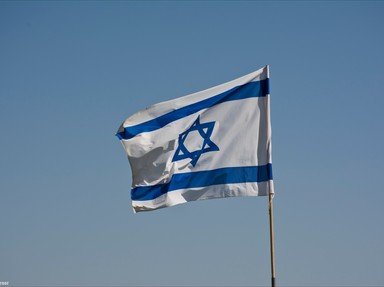Quiz Answer Key and Fun Facts
1. What does the word "Hatikvah", the name of Israel's national anthem, translate to in English?
2. Which of these Jewish poets is recognized as the author of the lyrics of the "Hatikvah"?
3. There are several English translations of the anthem's first line, "Kol 'od balevav penimah". Which of these blood-pumping organs is usually referred to in translations of this line?
4. The next line of the "Hatikvah" goes: "Nefesh Yehudi homiyah". Which of the following is an acceptable translation of that sentence?
5. The "Hatikvah" continues: "Ulfa'ate mizrach kadimah, Ayin leTziyon tzofiyah", which means something along the lines of "the eyes gaze toward ______".
Which word, historically used to refer to the Land of Israel and also the namesake of hills and mountains in Israel and the U.S., fills in the blank?
6. The "Hatikvah" is sung with more strength when it gets to this line: "Od lo avdah tikvatenu". Which of those four words was the original name of the poem that became the "Hatikvah"?
7. The next line, "Hatikvah bat shnot 'alpayim", references the approximate number of years that the Jews spent in exile waiting to one day go back to Israel. Which number, which may remind you of Y2K, is present in this part of the "Hatikvah"?
8. "Hatikvah" concludes with the words: "Lih-yot am chofshi b'ar-tzeinu, Eretz Tziyyon v'Yerushalayim", which means "To be a free nation in our land, the Land of Zion and Jerusalem".
What about this particular line is different from all the others in the anthem?
9. Many Holocaust survivors have relayed that "Hatikvah" was sung by Jewish prisoners even when hope seemed distant. At which Nazi concentration camp, which was also the place where Anne and Margot Frank perished, were survivors recorded singing "Hatikvah" by the BBC a few days after the camp was liberated by the British?
10. "Hatikvah" was not recognized as Israel's official national anthem until 2004, when the Parliament authorized an amendment to the Flag, Emblem, and National Anthem Law. What is the name of the Israeli parliament?
Source: Author
Lpez
This quiz was reviewed by FunTrivia editor
stedman before going online.
Any errors found in FunTrivia content are routinely corrected through our feedback system.

